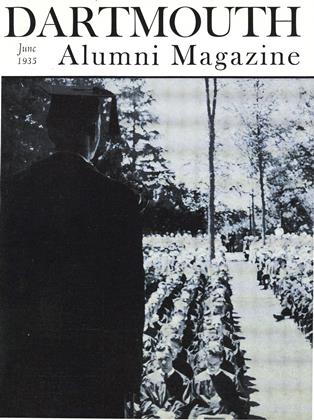A Conclusion
WITH THIS ISSUE of the MAGAZINE, the brief sketches of Hanover Townies pass out of existence. Their purpose has been to keep alive the memory of individuals a bit out of the ordinary and also to describe the time and customs of the period in which they lived. Dud, Lew and Adie, old man Amaral, and Sally Smith graced the nineties and early hundreds. Lon Gove, Charlie Hall, and John Poor spread over both periods, while the Neidlinger twins are a part of the present and future.
It is too bad that our obituaries do not embody an intimate living picture of the man they seek to portray. When the records of birth, marriage, religion, politics, and death are recorded, little space is left to tell just what sort of man he was and what his friends and associates really thought of him. We try to make a saint out of a real human being like ourselves, implying that he meant well and will no doubt enter the pearly gates. Our victims are beyond caring, relatives are pleased, and we have done our duty according to traditional rules. But no real man wants to be placed in the category of the hero of Thorton Wilder's book, Heaven IsMy Destination. Imagine such a man talking with John Poor. The real man still lives in the barber shops, on the street corners, and in the hotel lobby where men and.women congregate and talk plainly and intimately. The more unique the individual may be the longer he lives. The career and characteristics of some men appear in great novels and go on forever. If their fame is great, biographies are written and their deeds, thoughts, and mannerisms are indefinitely preserved. But this ordinary man that you knew and I knew and loved as much for his sins as for his virtues, dies and is buried in a shroud of statistics, platitudes, and "he meant well" phrases which conceal his real character beyond recognition.
So if there is any excuse for these sketches perhaps the real one is a sincere desire to recall an individual as you remembered him and as he meant himself to be known. The material is found in the market place not in books or formal records and not from the mouth of a professional mourner. These people were all a part of the life and history of the College and yet no formal history mentions Sally Prexy Smith whose influence on the social life of the College many think was greater than that of her father. How many members of the faculty will be remembered as long or as vividly as Lon Gove? What one man knew as intimately four successive presidents as did Charlie Hall?
If you think these sketches are interesting, true to memory, and of value to the traditions of the College, write and tell us. If you want more next year, send the name of one other whose career and viewpoint on life interested you.
It has been a pleasure to revive their memories and to try to paint a true picture so that once more you could see them, real human beings who made the world of their day more interesting and more vital by their presence. '
 View Full Issue
View Full Issue
More From This Issue
-
 Sports
SportsFOLLOWING THE BIG GREEN TEAMS
June 1935 By C. E. W. "30 -
 Class Notes
Class NotesClass of 1934
June 1935 By Martin J. Dwyer, Jr -
 Article
ArticleWAS THE PROFESSOR RIGHT?
June 1935 By Eric P. Kelly '06 -
 Class Notes
Class NotesClass of 1932
June 1935 By Charles H. Owsley, II -
 Class Notes
Class NotesClass of 1933
June 1935 By John S. Monagan -
 Article
ArticleHANOVER BROWSING
June 1935 By Herbert F. West '22
"Old Timer"
-
 Article
ArticleNoted Townies of the Past and Present
November 1934 By "Old Timer" -
 Article
ArticleNoted Townies of the Past and Present
December 1934 By "Old Timer" -
 Article
ArticleNoted Townies of the Past and Present
January 1935 By "Old Timer" -
 Article
ArticleNoted Townies of the Past and Present
February 1935 By "Old Timer" -
 Article
ArticleNoted Townies of the Past and Present
March 1935 By "Old Timer" -
 Article
ArticleNoted Townies of the Past and Present
May 1935 By "Old Timer"







